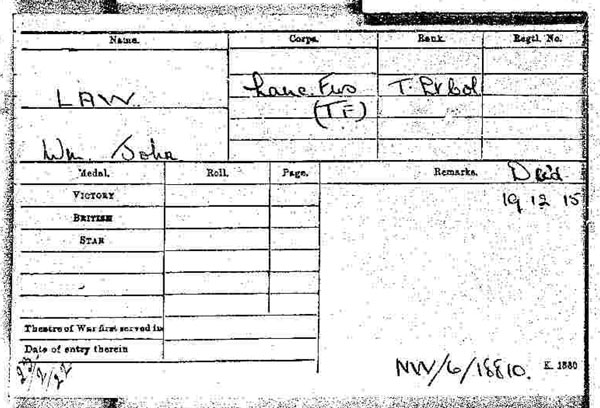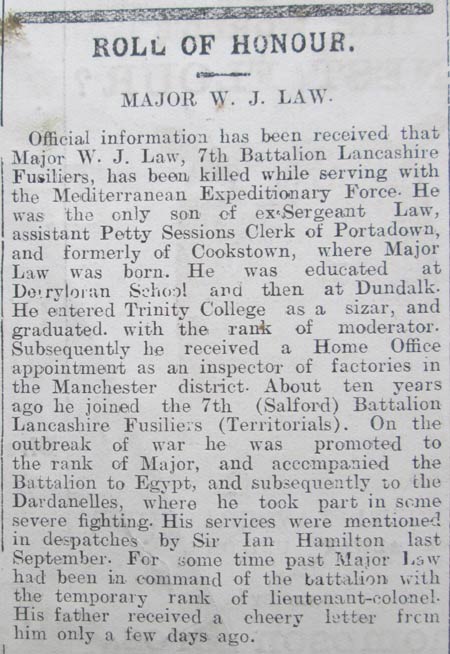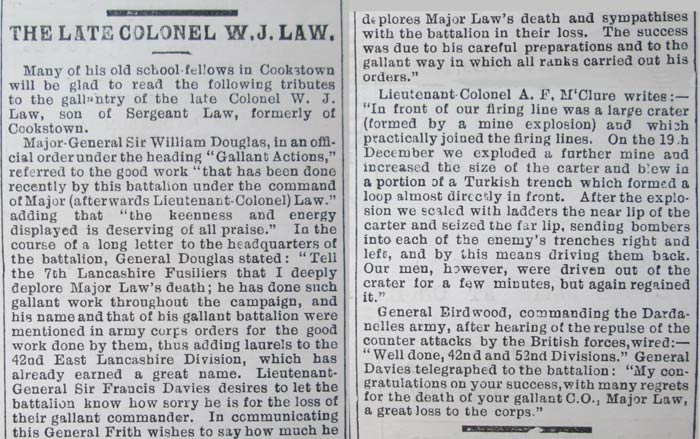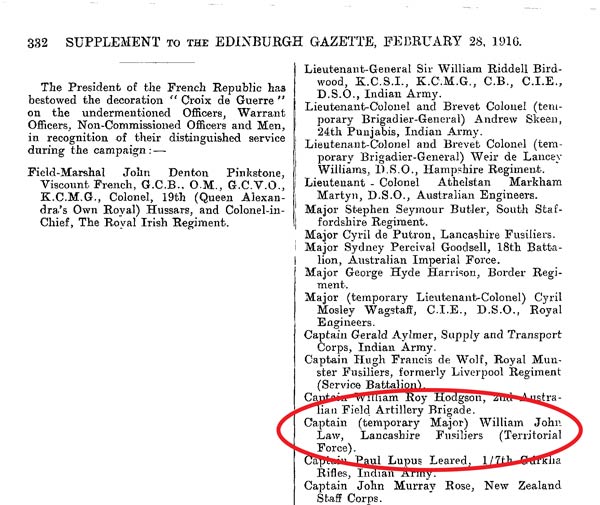| William John Law was the only son of Thomas and Margaretta Law.
|
| William Law was born in Cookstown on 10th April 1879. All three known children were born in Cookstown.
|
| Known Family: Thomas Law, Margaretta Law, William John Law (born 10th April 1879), Mary Georgina Law (born 8th September 1881)?, Harriet E Law (born 16th October 1884).
|
| His father was a Royal Irish Constabulary Sergeant and an assistant Petty Sessions clerk of Portadown.
|
| William was educated at Derryloran School, Cookstown and then in Dundalk.
|
| He entered Trinity College as a sizar. At Trinity College, Dublin and the University of Cambridge, a sizar is a student who receives some form of assistance such as meals, lower fees or lodging during his or her period of study, in some cases in return for doing a defined job. He graduated as a moderator.
|
| William Law was a sportsman as well as a scholar.
|
| He subsequently became one of His Majesty's Inspectors of Factories, and was for some years a junior inspector at Preston, Lancashire.
|
| In 1906 he joined the 7th (Salford) Battalion of the Lancashire Fusiliers (Territorial).
|

|
| At the out break of World War 1 in 1914 he was promoted to the rank of Major and accompanied his battalion to Egypt and subsequently to Gallipoli where he took part in some severe engagements.
|
| 1915
|
| In June 1915 Major Law was slightly wounded.
|
| From the Belfast Newsletter dated 14th September 1915: Portadown Officer at Dardanelles
|

|
| A Private in the 7th Battalion (Territorial) Lancashire Fusiliers has sent home an interesting account of his experiences at the Dardanelles, and incidentally describes an adventure which befell Major W J Law, a Portadown officer, who has been identified with the Lancashire Territorials for over ten years. Major Law is a son of Major J Law, Portadown, and brother of Mrs D G Loughrey, Cathedral Schools, Dromore. The 7th Lancashire Fusiliers, in which he is serving, was one of the first Territorial Battalions to volunteer for foreign service, and was ordered to Egypt in August last. The letter referred to contains the following:-
|
| ‘On one occasion six of us were carried off the head of a cliff 40 feet high by the bursting of a huge shell into a ravine among bushes, rocks and water. Two were killed, and three others were wounded and bruised and very badly shaken. I fell head first in a large furze bush, and luckily got off with a few scratches and a good shaking. It was an awful time, and it was over an hour before I could get help for the three wounded. The other two were buried where they fell. I was in the firing line four hours after that, but what I did I cannot remember until I was ordered back to the rear trenches and told to go for stretchers down to the second base hospital – a distance of two miles one way or three quarters of a mile down the ravine we were blown down. I elected to go this way, and found a way down, but it was very difficult and by no means safe. However, I managed it, and brought up a doctor and some stretcher bearers.
|
| Lord Rochdale and Major Lees were at the top when we got back, and thanked me, and told me I must not leave that spot, but stay there and act as guide. Permission was got from my captain (Captain Waterhouse, since dead). I lay there five or six hours under fire all the time, but I had made a fairly decent dugout to protect me from the shells, etc. About twelve o’clock I must have dozed off. I heard the voice of Major Law saying: ‘Men, we shall never get down that way.’ They were about twenty yards to the right of me when I called out ‘For God’s sake, stop.’ He called out ‘Who’s there?’ I said ‘Friend. Wait until I come.’ I then told him that he would have dropped sheer 100 yards if he had gone a few steps further. I told him who I was and where I was posted, and for what object. He asked me to guide him and his company down. I explained the difficulties, but he said they must get down at all cost.
|
| So off we started, and it was a most thrilling time for me, for fear I missed the way in the dark. After about an hour, we arrived safe in the stream at the bottom, with nothing worse than a few sprains and cuts in the whole company. I put the Major on the right track, and asked if any more were coming. He said no, so I asked permission to stop at the bottom until dawn. He said ‘Yes my good man, you have done your share for the night.’, and he took a note of my name and number.
|
| He was ‘Mentioned in Dispatches’ by Sir Ian Hamilton in September 1915 and soon after took over temporary command of his battalion with the rank of Lieutenant Colonel.
|
| Lieutenant Colonel William John Law was killed in action on 19th December 1915 during the Gallipoli campaign. He was 38 years old.
|
| 1916
|
| From the Mid Ulster Mail dated Saturday 1st January 1916: Major W J Law
|

|
| Official information has been received that Major W J Law has been killed while serving with the Mediterranean Expeditionary Force. He was the only son of ex-Sergeant Law, assistant Petty Sessions Clerk of Portadown, and formerly of Cookstown, where Major Law was born. He was educated at Derryloran School and then at Dundalk. He entered Trinity College as a sizar, and graduated with the rank of moderator. Subsequently he received a Home Office appointment as an inspector of factories in the Manchester district. About ten years ago he joined the 7th (Salford) Battalion Lancashire Fusiliers (Territorials). On the outbreak of war he was promoted to the rank of Major, and accompanied the battalion to Egypt, and subsequently to the Dardanelles, where he took part in some severe fighting. His services were mentioned in dispatches by Sir Ian Hamilton last September. For some time past Major Law had been in command of the battalion with the temporary rank of Lieutenant Colonel. His father received a cheery letter from him only a few days ago.
|
| From the Mid Ulster Mail dated Saturday 5th February 1916:
|

|
| Lieut-Col W J Law, 7th Lancaster Fusiliers (killed), only son of ex-Sergeant Law, formerly of Cookstown.
|
| From the Mid Ulster Mail dated Saturday 12th February 1916: The Late Colonel W J Law
|

|
| Many of his old school fellows in Cookstown will be glad to read the following tributes to the gallantry of the late Colonel W J Law, son of Sergeant Law, formerly of Cookstown. Major General Sir William Douglas, in an official order under the heading ’Gallant Actions’, referred to the good work ‘that has been done recently by this battalion under the command of Major (afterwards Lieutenant Colonel) Law’, adding that ‘the keenness and energy displayed is deserving of all praise.’ In the course of a long letter to the headquarters of the battalion, General Douglas stated : ‘Tell the 7th Lancashire Fusiliers that I deeply deplore Major Law’s death; he has done such gallant work throughout the campaign, and his name and that of his gallant battalion were mentioned in Army Corps orders for the good work done by them, thus adding laurels to the 42nd East Lancashire Division, which has already earned a great name. Lieutenant General Sir Francis Davis desires to let the battalion know how sorry he is for the loss of their gallant commander. In communicating this, General Frith wishes to say how much he deplores Major Law’s death and sympathises with the battalion in their loss. The success was due to his careful preparations and to the gallant way in which all ranks carried out his orders. Lieutenant Colonel A F McClure writes :-
|
| ‘In front of our firing lines was a large crater (formed by a mine explosion) and which practically joined the firing lines. On the 19th December 1915 we exploded a further mine and increased the size of the crater and blew in a portion of a Turkish trench which formed a loop almost directly in front. After the explosion we scaled with ladders the near lip of the crater, sending bombers into each of the enemy’s trenches right and left, and by this means driving them back. Our men, however, were driven out of the crater for a few minutes, but later regained it.’
|
| General Birdwood, commanding the Dardanelles army, after hearing of the repulse of the counter attacks by the British Forces, wired:-‘Well done, 42nd and 52nd Divisions.’. General Davies telegraphed to the Battalion: ‘My congratulations on your success, with many regrets for the death of your gallant C.O., Major Law, a great loss to the corps.’
|
| Lieutenant Colonel-William John Law was posthumously awarded the Croix de Guerre by the President of the French Republic in February 1916.
|

|
| From the Portadown News dated 29th July 1916:
|
| Lieutenant Colonel W J Law, Lancashire Fusiliers (killed), son of Mr Thomas Law, Margaretta Terrace, Portadown, has been further mentioned in despatches in connection with the Mediterranean operations.
|
| Many letters of condolence and respect were sent after the death of William John Law.
|
| A letter from, Major-General Sir William Douglas described Lieutenant Colonel Law’s Gallant Actions and his keenness and energy which deserved all praise.
|
| Lieutenant-Colonel A.F. McClure wrote:
|
| In front of our firing lines was a large crater (formed by a mine explosion) and which practically joined the firing lines. On the 19th December 1915 we exploded a further mine and increased the size of the crater and blew in a portion of a Turkish trench which formed a loop almost directly in front. After the explosion we scaled with ladders the near lip of the crater, sending bombers into each of the enemy’s trenches right and left, and by this means driving them back. Our men, however, were driven out of the crater for a few minutes, but later regained it.
|
| General Davies telegraphed the Battalion:
|
| “My congratulations on your success, with many regrets for the death of your gallant C.O., Major Law, a great loss to the corps.”
|
| Lieutenant Colonel-William John Law has no known grave and is commemorated on Twelve Tree Copse Memorial, Turkey.
|
| Lieutenant Colonel-William John Law does not seem to be listed on the Reading Rooms Memorial at Trinity College.
|
| Lieutenant Colonel-William John Law is listed on the Portadown War Memorial.
|

|
| There is a W J Hall on the Lurgan War Memorial.
|
| William J Law is listed on page 192 of the book ‘A Call to Arms, Portadown and the Great War’ by Richard Edgar.
|

|
